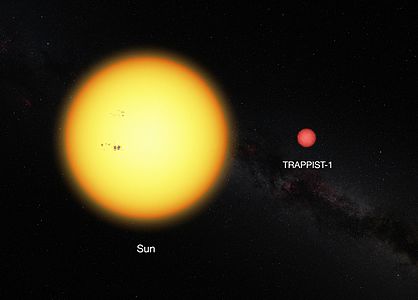Significance of recent exoplanets

March 23, 2017
The universe is borderless. In fact, it’s still expanding today. However the only thing that’s not increasing is the number of foreign galaxies, solar systems, and planets; and with our advancement in technology, we’re able to find more novel planets that were once out of our visibility.
Recently, NASA found 7 mostly Earth-like exoplanets, planets beyond our own solar system, located in Trappist 1 solar system, located 40 light years away from us. This shows that there is a higher possibility that there are exoplanets that can have much more similar attributes to Earth, thus meaning that the idea of extraterrestrial life is more plausible.
Fascinating, right? But what’s the point? Is there a significance of finding new Earth-like exoplanets and does it impact our own livelihood?
Max Pierson-Panes, a junior in the iSchool, says, “I think this will foster new space exploration, and it is an extremely important discovery as it will help motivate our exploration. It motivates us to explore space and gives us hope. It also shows we may not be alone in the universe.”
If there is life on other planets, how would we react? Are they like the alien from Alien vs. Predator? As of now, we have no real indications of foreign life, but as we continue to discover more exoplanets similar to Earth, we are bound to find foreign life soon–or so we think.
Some are quite fearful of finding extraterrestrial life forms because if we underestimate them, we can face a possible danger.
Ms. Figueroa, a learning specialist at the iSchool, fears that the foreign life may be more sophisticated than us: “It’s exciting because I would love to get an answer if there’s life on other planets. It’d be great but scary, like what if they more sophisticated and are more dominant. I hope at least one planet is habitable,” she hoped.
Similarly, Jalen Lopez, a freshman in the iSchool, said, “ I think that astrobiologist should do more research before going to other planets. It’s a little scary to see humans trying to go to a planet we know nothing about but it’s also interesting. I think it’s a little significant that we are trying to gain more knowledge on our universe but it’s also dangerous.”
However, others have a slightly more optimistic approach to exoplanet discovery.
A freshman, wanting to stay anonymous, says, “ I think it’s exciting that we are trying to get to new planets, but we can never get there.” He thinks that it is important to explore new planets: “ We can keep feeding our curiosity.”
The universe is expanding, and we must begin protocols of how to react when we find exoplanets that have the capabilities to sustain life such as us. Until then, we can only wait until we find another perfect “Earth.”

